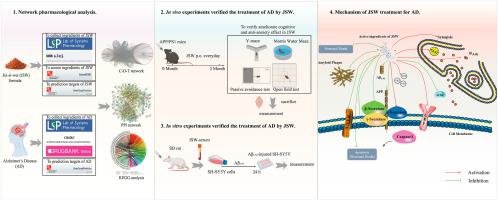Journal of Ethnopharmacology ( IF 4.8 ) Pub Date : 2023-11-02 , DOI: 10.1016/j.jep.2023.117291 Jiayi Zhi 1 , Li Yin 1 , Zhoudong Zhang 2 , Yaozhong Lv 3 , Fan Wu 1 , Yang Yang 1 , Enming Zhang 1 , Huanqiu Li 2 , Ning Lu 3 , Mengze Zhou 1 , Qinghua Hu 1

|
Ethnopharmacological relevance
Jin-Si-Wei (JSW), a traditional Chinese medicine (TCM) formula, have cognitive enhancing effect and delay the memory decline in an animal model of AD, which has been reported. However, the therapeutic mechanism of JSW in the treatment of AD remains unclear.
Aim of the study
This study aimed to verify the pharmacodynamics of JSW in the treatment of AD, and to explore its potential mechanism based on network pharmacology, molecular docking and experimental validation both in vitro and in vivo.
Materials and methods
In this study, the underlying mechanism of JSW against AD was investigated by the integration of network pharmacology. Then, the core pathways and biological process of JSW were verified by experiment, including behavioral test and pathological and biochemical assays with 6-month-old APPswe/PS1ΔE9 transgenic (APP/PS1) mice in vivo and verified with Aβ1-42-stimulated SH-SY5Y cells in vitro. At last, molecular docking was used to show the binding activity of each active ingredient to the core genes of JSW treatment in AD.
Results
A Drug-Ingredient-Target network was established, which included 363 ingredients and 116 targets related to the JSW treatment of AD. The main metabolic pathway of JSW treatment for AD is neuroactive ligand-receptor interaction pathway, and biological processes are mainly involved in Aβ metabolic process. In vivo experiments, compared with APP/PS1 mice, the cognitive and memory ability of mice was significantly improved after JSW administration. In brain tissue of APP/PS1 mice, JSW could increase the contents of low-density lipoprotein receptor-related protein 1 (LRP-1), enkephalinase (NEP) and Acetyl choline (ACh), and decrease the contents of Aβ1-42, amyloid precursor protein (APP) and receptor for advanced glycation end products (RAGE), decrease the vitality of cholinesterase (AChE) and choline acetyltransferase (ChAT). Besides, JSW could increase α-secretase expression and decrease β/γ-secretase expression, and improve the number and morphology of synapses in CA1 region of the hippocampus of APP/PS1 mice. In vitro experiments, Drug-Containing Serum (JSW-serum) has a neuroprotective effect by reducing the apoptosis on Aβ1-42-stimulated SH-SY5Y cells. Molecular docking results showed that 2-Isopropyl-8-methylphenanthrene-3,4-dione had strong binding activity with PTGS2, which maybe a potential ingredient for the treatment of AD.
Conclusions
JSW improves AD in APP/PS1 mice, and this therapeutic effect may be achieved in part by altering the neuroactive ligand-receptor interaction pathway.
中文翻译:

基于网络药理学的金丝味治疗阿尔茨海默病的分析
民族药理学相关性
据报道,金丝味(JSW)是一种中药配方,在 AD 动物模型中具有增强认知功能并延缓记忆衰退的作用。然而,JSW治疗AD的机制仍不清楚。
研究目的
本研究旨在验证JSW治疗AD的药效学,并基于网络药理学、分子对接和体内外实验验证探讨其潜在机制。
材料和方法
在这项研究中,通过整合网络药理学来研究JSW抗AD的潜在机制。然后,通过实验验证了JSW的核心通路和生物学过程,包括对6个月大的APP swe /PS1 ΔE9转基因(APP/PS1)小鼠进行体内行为测试和病理生化检测,并用Aβ 1-42进行验证-体外刺激SH-SY5Y细胞。最后通过分子对接显示各活性成分与JSW治疗AD核心基因的结合活性。
结果
建立了药物-成分-靶点网络,其中包括与JSW治疗AD相关的363种成分和116个靶点。 JSW治疗AD的主要代谢途径是神经活性配体-受体相互作用途径,生物过程主要涉及Aβ代谢过程。体内实验显示,与APP/PS1小鼠相比,JSW给药后小鼠的认知和记忆能力显着提高。在APP/PS1小鼠脑组织中,JSW可增加低密度脂蛋白受体相关蛋白1(LRP-1)、脑啡肽酶(NEP)和乙酰胆碱(ACh)的含量,降低Aβ 1-42的含量、淀粉样前体蛋白 (APP) 和晚期糖基化终末产物受体 (RAGE),降低胆碱酯酶 (AChE) 和胆碱乙酰转移酶 (ChAT) 的活力。此外,JSW还可增加APP/PS1小鼠海马CA1区α-分泌酶表达,降低β/γ-分泌酶表达,改善突触数量和形态。体外实验中,含药血清 (JSW-serum) 通过减少 Aβ 1-42刺激的 SH-SY5Y 细胞的凋亡而具有神经保护作用。分子对接结果表明,2-异丙基-8-甲基菲-3,4-二酮与PTGS2具有很强的结合活性,可能是治疗AD的潜在成分。
结论
JSW 可改善 APP/PS1 小鼠的 AD,这种治疗效果可能部分通过改变神经活性配体-受体相互作用途径来实现。

































 京公网安备 11010802027423号
京公网安备 11010802027423号